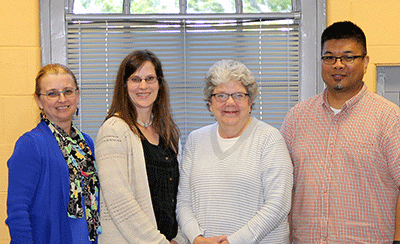
l-r, Kimberly VanHaitsma, associate professor of nursing, Pennsylvania State University; Katherine Abbott, assistant professor of sociology & gerontology and research fellow, Miami University Scripps Gerontology Center; Jane Straker, director of research, Miami University Scripps Gerontology Center; Jerry Gannod, chair and professor of computer science, Tennessee Tech University.
Miami University’s Scripps Gerontology Center has been awarded a $1 million grant from the Ohio Department of Medicaid to improve nursing home residents’ quality of life.
The project, “Incorporating the Preferences for Everyday Living into Ohio’s Nursing Homes to Improve Resident Care,” is intended to guide nursing home providers on the best way to deliver person-centered care by honoring their residents’ preferences for everyday living.
“Recent research suggests practicing person-centered care, an approach that emphasizes knowing the person and honoring each individual’s preferences, has the ability to improve health-related quality of life among nursing home residents,” said Katy Abbott, principal investigator of the study and assistant professor of gerontology.
Using data collected from the Preferences for Everyday Living Inventory (PELI), a valid and reliable instrument known to indicate nursing home residents’ most strongly held preferences, the project will assist providers with training on how to capitalize on the information collected.
Pete Van Runkle, executive director of the Ohio Health Care Association, said, “We are excited about this study by Scripps, because it will help move the ball forward on personalizing care in Ohio’s skilled nursing centers. Our members work hard everyday to make each patient’s experience the best it can be, and there is no better place to start than by understanding what really makes each person tick.”
The project is interdisciplinary in nature – comprised of researchers from the fields of gerontology, clinical psychology and computer science. By utilizing the expertise of all team members, the project will deliver nursing home providers with practical training about implementing preference-based person-centered care, as well as provide a user-friendly, technological framework to track nursing home residents’ preferences for everyday living over time.
“LeadingAge Ohio members are committed to quality in the services they provide,” said Kathryn Brod, president/CEO of LeadingAge Ohio. “Measurements of quality can be complex, and at the heart of quality is the satisfaction of those being served. Understanding resident preferences, therefore, is a key focus of proactive providers.”
For more information, please contact Kendall Leser, leserka@miamioh.edu.


